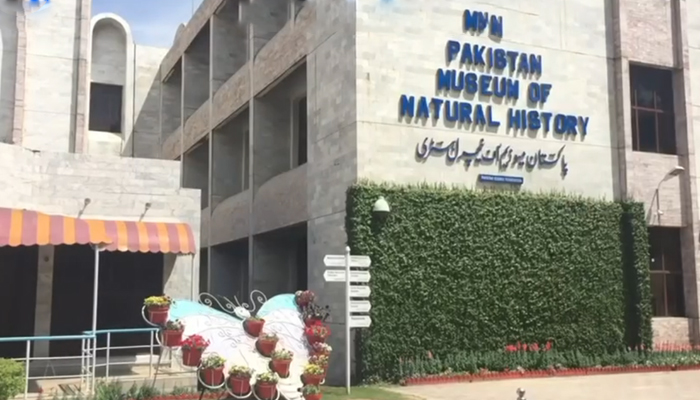Quality STEM education in focus as UNESCO gathers scientists in capital
Islamabad: UNESCO organised a scientists’ convention in Islamabad, underscoring the importance of quality STEM (Science, Technology, Engineering and Math education) and emphasizing science''s societal significance.
The event, held in collaboration with the Pakistan Science Foundation (PSF), Commission on Science and Technology for Sustainable Development in the South (COMSATS), and ECO Science Foundation (ECOSF), aimed to encourage public engagement in discussions on contemporary scientific issues.
In conjunction with this year’s World Science Day, three interactive sessions for students are scheduled on November 15 and 16, 2023, at the Pakistan Museum of Natural History, Islamabad.
These sessions focus on hands-on activities such as extracting DNA from fruits, effective laboratory practices, science communication, and exploring inertia, designed to spark students'' interest in STEM fields.
Since its inception in 2001, World Science Day for Peace and Development has sought to highlight science’s crucial role in society and engage the broader public in discussions on emerging scientific issues.
This year’s global theme, ''Building Trust in Science'' aligns with the ongoing efforts to enhance trust in science, which is vital for shaping our collective future.
During the convention, key figures including Dr. Youssef Filali-Meknassi, Director UNESCO, Islamabad, Prof. Dr. Shahid Mahmood Baig, S. I. , Chairman PSF, Dr. Seyed Komail Tayebi, President of ECO Science Foundation, Ambassador Dr. Mohammad Nafees Zakaria, Executive Director of COMSATS, and Dr. Abida Raza, Technical Director at the National Center of Industrial Biotechnology, PMAS-Arid Agriculture University, emphasized the role of science and the significance of STEM education.
Attendees included government officials, scientists, researchers, science communicators, and science journalists, collectively contributing to the dialogue on the crucial intersection of science, education, and public engagement. The attendees included government officials, scientists, researchers, science communicators, and science journalists.
-
 Heidi Klum Gushes Over Diplo Collab 'Red Eye' Despite DJ Falling Asleep During Video
Heidi Klum Gushes Over Diplo Collab 'Red Eye' Despite DJ Falling Asleep During Video -
 Israel Behind Majority Of Journalist Deaths Worldwide, Watchdog Claims
Israel Behind Majority Of Journalist Deaths Worldwide, Watchdog Claims -
 'It Would Become A Circus' : Inside Jane's Turmoil For 'little Sister' Fergie Whose Hidden From The World
'It Would Become A Circus' : Inside Jane's Turmoil For 'little Sister' Fergie Whose Hidden From The World -
 Inside Cardi B's Real Feelings Related To Stefon Diggs Split Post One Year Of Romance
Inside Cardi B's Real Feelings Related To Stefon Diggs Split Post One Year Of Romance -
 Former Sri Lankan Intelligence Chief Arrested Over 2019 Easter Bombings
Former Sri Lankan Intelligence Chief Arrested Over 2019 Easter Bombings -
 Kristen Bell Shares One Rule For 'SAG' Awards Ceremony That She Will Ditch This Time: 'Happy And Fun'
Kristen Bell Shares One Rule For 'SAG' Awards Ceremony That She Will Ditch This Time: 'Happy And Fun' -
 Woman Suing Meta Platforms, YouTube Over Social Media Addiction Sticks To Claims After Trial
Woman Suing Meta Platforms, YouTube Over Social Media Addiction Sticks To Claims After Trial -
 Shakira Applauded For 'gracious' Behaviour By Fans As She Blends Work With Family Downtime
Shakira Applauded For 'gracious' Behaviour By Fans As She Blends Work With Family Downtime -
 Prince William Hits The Roof With The Andrew Saga Bleeding Into Earthshot
Prince William Hits The Roof With The Andrew Saga Bleeding Into Earthshot -
 Mexico’s President Considers Legal Action Over Elon Musk Cartel Remark
Mexico’s President Considers Legal Action Over Elon Musk Cartel Remark -
 HBO Gives Major Update About 'Industry' Season Five And Show's End
HBO Gives Major Update About 'Industry' Season Five And Show's End -
 Donnie Wahlberg Responds To 'Boston Blue' Backlash: 'Nobody Was More Disappointed Than Me'
Donnie Wahlberg Responds To 'Boston Blue' Backlash: 'Nobody Was More Disappointed Than Me' -
 Jennifer Garner Gets Emotional Over Humble Career Start: 'It Makes Me Want To Cry'
Jennifer Garner Gets Emotional Over Humble Career Start: 'It Makes Me Want To Cry' -
 Princess Beatrice Told An Acquaintance That She ‘likes’ Jeffrey Epstein: Grim Verdict Drops
Princess Beatrice Told An Acquaintance That She ‘likes’ Jeffrey Epstein: Grim Verdict Drops -
 Late Katherine Short's Neighbours Give Insights Into Her 'peace Loving' Personality Post Suicide
Late Katherine Short's Neighbours Give Insights Into Her 'peace Loving' Personality Post Suicide -
 Fresh Details Of King Charles, Queen Camilla's US Visit Emerge Amid Andrew Investigation
Fresh Details Of King Charles, Queen Camilla's US Visit Emerge Amid Andrew Investigation




